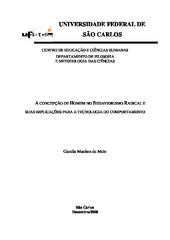| dc.contributor.author | Melo, Camila Muchon de | |
| dc.date.accessioned | 2016-06-02T20:12:14Z | |
| dc.date.available | 2009-12-09 | |
| dc.date.available | 2016-06-02T20:12:14Z | |
| dc.date.issued | 2008-12-19 | |
| dc.identifier.citation | MELO, Camila Muchon de. The conception of Man in Radical Behaviorism and its implications for Behavioral Technology. 2008. 359 f. Tese (Doutorado em Ciências Humanas) - Universidade Federal de São Carlos, São Carlos, 2008. | por |
| dc.identifier.uri | https://repositorio.ufscar.br/handle/ufscar/4770 | |
| dc.description.abstract | B. F. Skinner describes and explains the human behavior through the causal model of selection by consequences. According to this model, the human behavior is the product of the interaction among three levels of variability and selection (phylogeny, ontogeny and culture). According to this explanation, the cultural contingencies enable the rising and maintenance of behaviors that may produce consequences which strengthen a culture and these are the behaviors which participate as operant behaviors in the constituting of a cultural practice. The Man is a product of three processes of variation and selection. Within this, especially due to the third level, he is a Man that may also plan new variations which may perform a role on the strengthening of a culture and therefore he must plan contingencies so that the behavior produces the good of the culture. The cultural planning directed to the survival of the culture elicits questionings on the Behavioral Technology proposed to enable the insertion of new cultural practices. Thus, this study had the objective of investigating if the conception of Man in Radical Behaviorism in Skinner s works, interpreted as a commitment with the good of the culture, is consistent with the proposal of this author of a Behavioral Technology. Aspects of Science and Ethics based on the Philosophy of Radical Behaviorism have been investigated. Moreover, some examples of behavioral technology based on this philosophy have illustrated our analyses in the defense of a technology which produce consequences which may strengthen a culture. Using methods of text analyses and of epistemological-hermeneutic, texts from the author previously selected which refer to the concepts of Man, culture, science, ethics and technology have been analyzed in order to identify the inconsistencies, clarify or explain the conception of Man and Behavioral Technology proposed by the model of selection by consequences of the Skinner s Radical Behaviorism. | eng |
| dc.description.sponsorship | Universidade Federal de Minas Gerais | |
| dc.format | application/pdf | por |
| dc.language | por | por |
| dc.publisher | Universidade Federal de São Carlos | por |
| dc.rights | Acesso Aberto | por |
| dc.subject | Behaviorismo radical | por |
| dc.subject | Análise do comportamento | por |
| dc.subject | Seleção por consequências | por |
| dc.subject | Cultura | por |
| dc.subject | Ética | por |
| dc.subject | Tecnologia comportamental | por |
| dc.subject | Radical Behaviorism | eng |
| dc.subject | Selection by consequences | eng |
| dc.subject | Culture | eng |
| dc.subject | Behavioral technology | eng |
| dc.subject | Behavioral science | eng |
| dc.subject | Ethics | eng |
| dc.title | A concepção de homem no Behaviorismo radical e suas implicações para a tecnologia do comportamento | por |
| dc.title.alternative | The conception of Man in Radical Behaviorism and its implications for Behavioral Technology | eng |
| dc.type | Tese | por |
| dc.contributor.advisor1 | Rose, Julio Cesar Coelho de | |
| dc.contributor.advisor1Lattes | http://lattes.cnpq.br/3386857761295187 | por |
| dc.description.resumo | B. F. Skinner descreve e explica o comportamento humano por meio do modelo causal de seleção pelas consequências. Segundo esse modelo, o comportamento humano é o produto da interação entre três níveis de variação e seleção (filogênese, ontogênese e cultura). De acordo com essa explicação, as contingências culturais possibilitam a emergência e a manutenção de comportamentos que podem produzir consequências que fortaleçam uma cultura, são os comportamentos que participam como operantes constituintes de uma prática cultural. O Homem é o produto dos três processos de variação e seleção. Dentro disso, em função principalmente do terceiro nível, é um Homem que pode também planejar novas variações que possam ter um papel sobre o fortalecimento da cultura e, sendo assim, deve planejar contingências para que o comportamento produza o bem da cultura. O planejamento cultural direcionado para a sobrevivência da cultura elucida questionamentos acerca da Tecnologia Comportamental proposta para viabilizar a inserção de novas práticas culturais. Assim, este estudo teve o objetivo de investigar se a concepção de Homem no Behaviorismo Radical de Skinner, interpretada como um compromisso com o bem da cultura, é consistente com a proposta desse autor de uma Tecnologia do Comportamento. Aspectos da ciência e da ética baseados na filosofia do Behaviorismo Radical foram investigados. Além disso, alguns exemplos de tecnologia do comportamento fundamentados nessa filosofia ilustraram nossa análise na defesa de uma tecnologia que produza consequências que possam fortalecer uma cultura. Utilizando-se dos métodos de análise de texto e epistemológico-hermenêutico, textos do autor previamente selecionados que fizeram referência aos conceitos de Homem, cultura, ciência, ética e tecnologia foram analisados para indicar as incongruências, esclarecimentos ou explicações entre a concepção de Homem e a Tecnologia Comportamental proposta pelo modelo de seleção pelas conseqüências do Behaviorismo Radical de Skinner | por |
| dc.publisher.country | BR | por |
| dc.publisher.initials | UFSCar | por |
| dc.publisher.program | Programa de Pós-Graduação em Filosofia - PPGFil | por |
| dc.subject.cnpq | CIENCIAS HUMANAS::FILOSOFIA | por |
| dc.contributor.authorlattes | http://lattes.cnpq.br/1015798975492836 | por |
